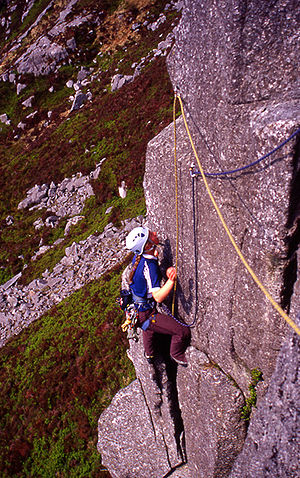- Image via Wikipedia
Carol: as you develop experience with working for new and different bosses, you find yourself with a standard strategy of how to size them up and find out what makes them tick so that you can work with them and for them? Do you find yourself spending more or less time with that the more often your bosses change. How good are we had really reading peoples take motivations and personal preferences and how much time do we take to be certain of what our first impressions lead us to believe?
I share your concerns about the trade-off between reward and risk when it comes to taking on experiments. As you have seen in my commentary on Heifetz, I don’t think they give this important judgment enough treatment.
Regarding Brenda’s comments about leaders and a willingness to take on risk. The most successful risk managers that I know, and I work with many on a professional basis in the world of both finance and defense, all share a quality of a finely tuned ability to compare rewards with risks and a sense of how close to the edge they can navigate safely or relatively safely. An unwillingness to approach the boundary condition limits leaders abilities to move to the highest levels of an organization where complexity and uncertainty dwell but conversely where the greatest rewards and risks also dwell. It is precisely the ability to successfully navigate uncertainty for the highest of stakes that distinguishes the qualities of successful senior leaderships in my experience.
Regarding Tamara’s comments about the risk-averse boss: you can see here a case where the boss is overcome by his vision of risk that he can’t see the reward and cannot figure out how to successfully integrate the two into actionable decisions while at the same time providing protection for the consequences of the actions for the rest of the organization. He’s been promoted beyond his ability based on what you’ve described. An unwillingness to act to seize opportunity is a natural response to overwhelming uncertainty. A friend of mine who is one of the most successful commodity traders in the world has a program of recruiting talent which examines this ability. Carefully and it is clearly one that is affected by the size of stakes. He has traders who can trade million-dollar accounts professionally but who cannot trade a $10 million account because they get overcome by the number of zeros. It is the context of the consequences of our decisions which make the decisions more difficult on the inside than they may seem to the outside observer.
This is why I think Heifetz’s discussion on creating a sense of false confidence to be so dangerous. I am much more interested in examining what the basis for a feeling of confidence is than trying to convince yourself through the power of positive thinking to go beyond your skill level
Related articles by Zemanta
- Trading Ideas: Catching the Risk Mood Early in the Day (seekingalpha.com)
- Going Against Gold: What Risk Management Is All About (seekingalpha.com)
- It’s not trust. It’s social capital. (socialmediatoday.com)
- Markets in everything, Part 471: Hooray for Hollywood (parkparadigm.com)
- Technical Executives Discuss Challenges with Breaking Barriers to Cultural Change in Corporations (eon.businesswire.com)
- Learn the True Characteristics of an Entrepreneur (yearn2blog.com)


![Reblog this post [with Zemanta]](http://img.zemanta.com/reblog_e.png?x-id=f6ce05e7-3c17-4a23-8cb9-a6487bf5f566)